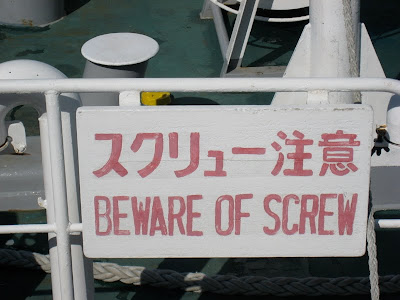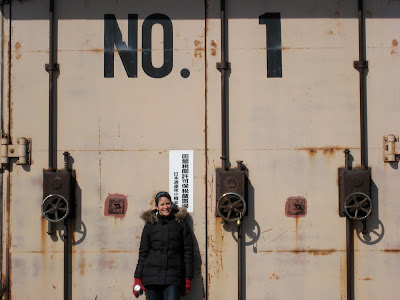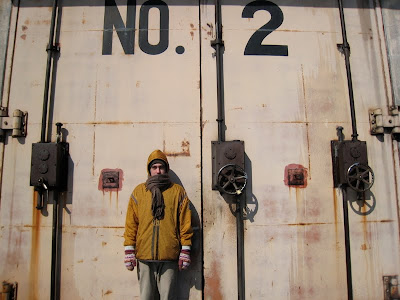
Part I | Part II | Part III | Part IV
Our last day in Hokkaido was a lot less interesting to us than it was to the people around us. Everywhere we went, Sergey and I were the main topic of conversation. I say this not out of paranoia or megalomania, but out of an ability to understand Japanese.
For example, our decision to eat a low-budget breakfast at the train station was a gossip-filled affair. We bought two bowls of instant ramen and sat on a bench in the waiting room. Three older Japanese women sitting on the bench directly behind us gave a running commentary on our every move.
"Look! Gaijin!"
"What are they doing?"
"They're eating ramen."
"It looks like they're enjoying it."
"It sure does."
"They're using chopsticks."
"They sure are."
Sergey and I pretended we couldn't understand them, bending our heads over our cups of ramen so they couldn't see us smiling. It was fun eavesdropping on the locals. They talked about us like we were monkeys in a zoo.
This was about as exciting as our last day in Hokkaido got. Not that I'm complaining. An uneventful day was exactly what we needed after the misadventure-plagued portion of the trip. We were determined not to repeat the same stupid mistakes that got us into trouble in the first place -- like not checking the ferry schedule and getting stuck in Hokkaido an extra day. We couldn't afford to miss the ferry again so instead of simply checking the schedule online, we walked three kilometres to the ferry terminal first thing in the morning to book our tickets for the sailing later that night.
It was our second trip to the ferry terminal but this time the lights were on and the doors were open. We had 12 hours to kill before the ferry left so we decided to head out for another hike in the hills. But we stopped so many times along the way that we didn't even make it to the base of the mountain.
Our first stop was to see if the snowman we built the day before was still standing. It wasn't. Someone had cruelly kicked the snowman in the stomach and its body laid in pieces on the ground. The one-yen coins that served as the snowman's eyes had been plucked out of his head and, presumably, tucked into the perpetrator's pocket. We were sad for a moment but realized there was no point mourning the loss of a few clumps of snow -- our cute little Mible was no more.
We continued on toward the mountain, and accidentally stumbled onto Otaru's main tourist strip. Despite covering most of the town on foot the day before, we had somehow missed Otaru's biggest attraction -- an intersection decorated with three different clock towers.

I don't know for a fact whether this is Otaru's biggest attraction or not, but there were at least 60 tourists taking pictures of the clock towers and we hadn't seen any tourists taking pictures of anything up until now so the odds were pretty good that this intersection was a big deal.
We joined the crowd and took our own pointless photos. We browsed through a massive store selling thousands of miniature clock towers and a few stuffed octopuses (whose relationship to the clock towers is still unclear).

We eventually left the clock towers behind and continued hiking toward the mountain but it wasn't long before we were sidetracked again. The glow of McDonald's golden arches caught Sergey's eye. But, sadly for Sergey, his beloved McPork wasn't on the menu.
It was starting to get dark and we were still nowhere near the mountain. We decided to give up on the hike and take the bus back into town. But we were too tired to figure out which bus to take or which bus stop to stand at so we simply walked back. Walking back required no brainpower. We didn't even need to look at the map. By this point, we had visited every tourist attraction and walked every square inch of every street -- twice. We could have written the Lonely Planet guide to Otaru.


Back in town, we had time for dinner and coffee before making our way to the ferry terminal for the long trip home. The ferry heading back to Honshu was much busier than the one that took us to Hokkaido. There were about 50 people on board. Although, technically speaking, 50 people on board a boat built for 1,000 doesn't make it "busy." It just felt busy compared to the grand total of eight passengers on the ferry on the way over.
Luckily, the ferry plowed through nothing but calm seas during the 20-hour sailing. I didn't have to deal with the roiling waves and low-grade seasickness that kept me flat on my back on the way to Hokkaido. This time around, I only felt like throwing up after eating "kimichi and cheese" instant ramen.

Aside from a poor choice in soup, the ferry ride was thoroughly enjoyable. The on-board entertainment was top notch. We were treated to a live concert by two restaurant workers who play in a jazz band in their spare time. They played such hits as "Sometimes When we Touch."
They chatted up the audience in between songs. They told us they perform on the ferry every day but they were especially happy today because normally only three people turn up to hear them play. Today they were playing for a record-breaking crowd of 16 (almost half of all the passengers on board).

The rest of the ferry ride was uneventful. The trip was ending on a calm note -- completely opposite to its chaotic start. We went to Hokkaido for the majestic mountains, the outdoor onsens, and the fabulous food. Except we took a wrong turn somewhere along the way and ended up on a tour of northern Japan that was more farce than fantasy.
Everything that could go wrong did go wrong. But that was part of the trip's charm. It may have gone sideways but it was never boring. Especially when we got kicked out of McDonald's at 4 a.m. with no other accommodation lined up for the night. To steal a line from Hunter S. Thompson, it never got weird enough for us.








